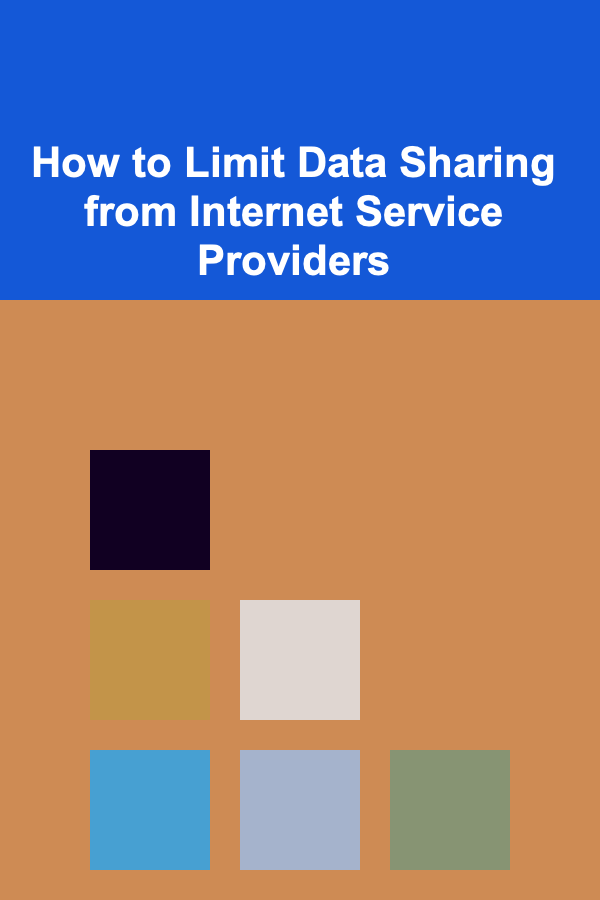
How to Limit Data Sharing from Internet Service Providers
ebook include PDF & Audio bundle (Micro Guide)
$12.99$5.99
Limited Time Offer! Order within the next:

In an age where digital footprints are becoming increasingly significant, safeguarding personal privacy has become a top priority for many individuals. One area where privacy concerns often arise is with Internet Service Providers (ISPs). ISPs have access to vast amounts of personal information about their users, ranging from browsing history to online behaviors, and they can sometimes share or sell this data to third parties. Understanding how to limit data sharing from ISPs is critical to maintaining a level of privacy online. This article will explore practical steps that individuals can take to limit the data shared with ISPs, as well as broader concepts about digital privacy.
Understanding the Role of ISPs
Before delving into how to limit data sharing, it is essential to first understand what ISPs do and why they have access to such a large volume of data.
What ISPs Can See
An ISP provides the infrastructure that allows you to access the internet. Whenever you connect to the web, your ISP is responsible for routing your traffic through their servers, which means they have access to certain data about your online activities. This can include:
- Browsing History: ISPs can track the websites you visit, how long you stay on them, and the frequency of your visits.
- Traffic Metadata: They can also see when you connect to certain websites or services, even if they can't always see the content (unless the traffic is unencrypted).
- Search Queries: When you perform searches on platforms like Google, ISPs can see the IP address from which the search originates, linking that to your identity.
- Location Data: Since your internet connection is tied to a physical location, ISPs can track and log your location data through your IP address.
Why ISPs Share Your Data
ISPs often collect and share user data for various reasons. These can include:
- Advertising: Many ISPs sell your browsing data to third-party advertisers who use it to target you with personalized ads.
- Legal Compliance: In some countries, ISPs are legally required to retain user data and provide it to law enforcement upon request.
- Service Improvement: ISPs may also analyze user data to improve their services, optimize network performance, and troubleshoot issues.
While some of these reasons are legitimate, the sharing of personal data without consent raises concerns about privacy and security.
Legal Protections and the Limits of ISP Data Sharing
The ability of an ISP to share your data is influenced by both local laws and the terms of service agreements you sign when subscribing to their services. In many countries, ISPs must comply with privacy laws that restrict how they can handle your data. However, these laws are often complex and can vary greatly depending on where you live.
GDPR and Data Privacy Laws
The General Data Protection Regulation (GDPR), enacted in the European Union (EU), is one of the most robust privacy frameworks in the world. It places strict limitations on how companies, including ISPs, can collect, store, and share personal data. Under the GDPR:
- Consent: ISPs must obtain clear and explicit consent before collecting and processing any personal data.
- Right to Access: Users have the right to access any data that an ISP has about them.
- Data Minimization: ISPs are required to limit the amount of personal data they collect to only what is necessary for the service.
- Right to Erasure: Users can request that their data be deleted, also known as the "right to be forgotten."
If you live in the EU or a country that follows similar data privacy regulations, your ISP's ability to share your data is limited, and you may have recourse if you believe your rights have been violated.
However, the situation in other parts of the world is different. In the United States, for instance, privacy laws vary by state and often do not provide the same level of protection. The Federal Communications Commission (FCC) once enacted privacy rules for ISPs, but these were rolled back in recent years. As a result, ISPs in the U.S. have greater freedom to share and sell user data.
Practical Steps to Limit Data Sharing from ISPs
While legal protections are important, they do not always go far enough to protect personal privacy. Fortunately, there are several proactive steps you can take to limit the data your ISP collects and shares.
1. Use a Virtual Private Network (VPN)
A VPN is one of the most effective tools for protecting your online privacy. When you use a VPN, your internet traffic is encrypted, and your real IP address is replaced with the IP address of the VPN server. This prevents your ISP from seeing the websites you visit or the content of your traffic.
- Encryption: VPNs encrypt your data, making it unreadable to anyone who might intercept it, including your ISP.
- IP Masking: By masking your real IP address, VPNs make it harder for ISPs to track your online activities and associate them with your identity.
- Bypass Throttling: Some ISPs throttle (slow down) internet speeds for certain activities like streaming or gaming. Using a VPN can help bypass this throttling by hiding the type of traffic you're engaging in.
When choosing a VPN, it is essential to pick one that has a strict no-logs policy, meaning they do not store any information about your activities.
2. Use Encrypted Communication Services
Many ISPs can track not just your web browsing, but also the content of your communications. If you use unencrypted email services or messaging platforms, your ISP can potentially access this information. To prevent this, use encrypted services like:
- End-to-end encrypted email services like ProtonMail or Tutanota.
- Messaging apps like Signal or WhatsApp that use end-to-end encryption to protect the content of your conversations.
- Encrypted video call services, such as those provided by Zoom or Signal, which ensure that your calls cannot be intercepted or monitored.
By using these encrypted services, you reduce the risk of having your private communications exposed to your ISP.
3. Opt for HTTPS Websites
The HTTPS protocol ensures that the data exchanged between your browser and a website is encrypted. Unlike HTTP, which sends data in plain text, HTTPS uses SSL/TLS encryption to protect your communications.
While HTTPS does not completely hide your browsing activity from your ISP (they can still see the domain you're visiting), it does prevent them from accessing the contents of the pages you're viewing, including sensitive data like login credentials and personal messages.
Always make sure to visit websites that use HTTPS, especially when entering sensitive information. Most modern browsers, like Chrome and Firefox, now indicate whether a site is secure by displaying a padlock icon in the address bar.
4. Use a DNS Over HTTPS (DoH) or DNS Over TLS (DoT) Service
Your Domain Name System (DNS) queries reveal the websites you are visiting. When you type a URL into your browser, the DNS resolves that URL to an IP address, which can be logged by your ISP.
By using DNS over HTTPS (DoH) or DNS over TLS (DoT) , you can encrypt your DNS queries, making it more difficult for your ISP to track the websites you visit. Many public DNS services, such as Cloudflare's 1.1.1.1 or Google DNS, offer these encrypted DNS services.
Switching to a DNS provider that supports these protocols helps protect your privacy and keeps your browsing history hidden from your ISP.
5. Avoid Using Your ISP's Default DNS
In addition to DNS over HTTPS or TLS, you can improve your privacy by switching from your ISP's default DNS servers to a third-party provider that prioritizes privacy. Some DNS providers, like Cloudflare and Quad9, do not log your queries and do not share your data with third parties.
Using a privacy-focused DNS service ensures that your ISP does not have access to your browsing history via DNS logs, further reducing the amount of data they can collect.
6. Review Your ISP's Privacy Policy
It is essential to understand your ISP's privacy policy before subscribing to their services. Some ISPs have more stringent data protection practices than others. By reviewing the policy, you can:
- Opt-out of data collection: Some ISPs offer the option to opt-out of data-sharing practices, such as personalized advertising.
- Request data deletion: If your ISP retains your data for a period, you can request them to delete your personal data under certain privacy regulations (like GDPR).
If you're not satisfied with your ISP's data-sharing practices, consider switching to a more privacy-conscious provider, if available.
7. Use Tor for Anonymity
The Tor network is a free, open-source project that provides anonymous communication by routing your internet traffic through a series of relays. When you use Tor, your ISP cannot easily trace your activities or your physical location. Additionally, Tor obscures your browsing history from websites and other third parties.
However, Tor is not without its drawbacks. It can slow down your internet connection due to the routing process, and some websites may block Tor traffic. Despite these limitations, Tor is an excellent tool for those who prioritize privacy above all else.
8. Limit the Use of Smart Devices
Smart devices, like smart speakers, home assistants, and even smart TVs, can collect and share data with manufacturers and sometimes third parties. While they don't directly share information with your ISP, they can indirectly provide them with valuable insights into your activities.
To reduce data collection, disable unnecessary smart features or restrict device access to your personal data. Some devices allow you to turn off data sharing features, which can help reduce overall data sharing.
Conclusion
Limiting data sharing from ISPs is essential for maintaining privacy and ensuring that your online activities remain secure. While ISPs naturally have access to much of your internet usage data, taking proactive steps like using VPNs, encrypted communication services, and more secure DNS options can significantly reduce the amount of data they can collect. Furthermore, understanding the legal landscape and reviewing your ISP's privacy policies ensures that you are well-informed and able to take full advantage of any available privacy protections.
By combining these tools and practices, you can take control of your digital privacy and limit the extent to which your ISP collects, shares, or sells your data. As privacy becomes increasingly important in the digital age, it is up to each individual to make informed choices and take the necessary precautions to safeguard their personal information online.

How to Add Layers of Light to Your Dining Room for Special Occasions
Read More
How to Capture Stunning Photos of Your Staged Home
Read More
How to Handle Late Rent Payments from Tenants
Read More
How to Keep Track of Assignments and Due Dates Effectively
Read More
How to Leverage Real Estate Investment Trusts (REITs)
Read More
Where Passion Meets Purpose: How to Stand Out by Doing What You Love
Read MoreOther Products

How to Add Layers of Light to Your Dining Room for Special Occasions
Read More
How to Capture Stunning Photos of Your Staged Home
Read More
How to Handle Late Rent Payments from Tenants
Read More
How to Keep Track of Assignments and Due Dates Effectively
Read More
How to Leverage Real Estate Investment Trusts (REITs)
Read More